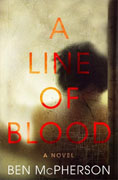A Line of Blood
Ben McPherson
book reviews:
· general fiction
· chick lit/romance
· sci-fi/fantasy
· graphic novels
· nonfiction
· audio books
· author interviews
· children's books @
curledupkids.com
· DVD reviews @
curledupdvd.com
newsletter
win books
buy online
links
home
for authors
& publishers
for reviewers

 |
A Line of Blood Ben McPherson William Morrow Hardcover 416 pages September 2015 |
|
Click here to read reviewer Michael Leonard's take on A Line of Blood. The family Alex calls “his little tribe” reeks of emotional incest, the hyper-concern of a father about his son’s perceptions, the almost feminine way he hovers over an eleven-year-old boy, albeit a precocious one. When she finally enters the scene, his wife resists her role as well, refusing accountability for her absences, ambivalent and unpredictable. Yet they speak a language unique to the three of them, a subtle shorthand. The Mercers--Alex, Millicent and Max--live in London, in an area residents call “Crappy”--the very worst parts of Finsbury Park, an ironic name in a close-built neighborhood with meager yards dividing living spaces. Alex and American-born Millicent are proud of their manner of “parenting” Max (“Max Man”), the boy eccentric and intelligent, monitoring his parents as closely as they do him.
Unable to explain his wife’s absence from home when the police inquire, Alex is anxious, noticeably reticent while speaking to officers, while Max holds nothing back, uninhibited about the dead body they found next door. His nervousness unabated, Alex reveals more details about his family’s life in recent years, relating both private fears and faults, the doubts born of an impulsive marriage to the fascinating American woman who caught his eye. Both self-employed (Alex a producer and Millicent a writer currently considering a call-in radio broadcast), the couple’s bizarre behavior suits their personalities and lifestyle. After a traumatic loss, they have coped as well as possible, Millicent wandering from the confines of home when she can’t sleep, convinced she must work out her problems in solitude. Max hops between his parents like a nervous auntie, prodding, reminding, cajoling, comforting, as though he is the parent and they the children. Alex obsessively ruminates over his own, Millicent’s and Max’s behavior, but is without introspection, incapable of more than rationalization, never really inhabiting his life. Millicent is the same: needy, independent and self-absorbed, reverting to emotional outbursts when unable to explain her behavior, easily manipulating her husband. While Alex appears weak and ineffectual as a spouse, he harbors a darker side, just as self-possessed as his wife. They are, perhaps, a well-matched pair, modern parents passing on their narcissism to their son. They are a modern couple, able to send their bright child to a private school, using professionals to address problems, functioning members of the community. The rules are unspoken if inviolable: Don’t tell family secrets. This dichotomy is the crux of McPherson’s novel, below-the-surface shifts that signal something amiss with this family of progressive parents and exceptional son, a smooth façade that obscures the truth. Pacts are made behind closed doors, secrets kept. In essence, this very creepy tale had me cringing from the first page, replete with unlikable characters and the suspicion that nothing is as it seems, none of their motives to be trusted. Dry and glib, the novel unfolds with an absence of passion that renders everyone lifeless, one-dimensional. Perhaps the place, laboring under the unfortunate moniker of Crappy, infects the lives of inhabitants, a world where all is nominally proper but nothing is tangible, shiny on one side, ugly on the other. Originally published on Curled Up With A Good Book at www.curledup.com. © Luan Gaines, 2015 |
| Also by Ben McPherson: |
|
|
|
 Click here to learn more about this month's sponsor! |
|
| fiction · sf/f · comic books · nonfiction · audio newsletter · free book contest · buy books online review index · links · · authors & publishers reviewers |
|
| site by ELBO Computing Resources, Inc. | |
 In the opening scene, Max calls Alex to help him locate their cat late at night. As Max scrambles over the neighbor’s fence in pursuit of the elusive pet, he leads his father into the house, where they hear the faint dripping of water. Getting no response to repeated calls of their presence, father and son proceed up the stairs to discover the neighbor dead in his bath. Alex registers the details of the naked man’s demise, likely by electrocution. Only later does he agonize over what Max might have seen, the image seared upon the boy’s psyche. Alex calls police from his home, suddenly nervous and ill at ease.
In the opening scene, Max calls Alex to help him locate their cat late at night. As Max scrambles over the neighbor’s fence in pursuit of the elusive pet, he leads his father into the house, where they hear the faint dripping of water. Getting no response to repeated calls of their presence, father and son proceed up the stairs to discover the neighbor dead in his bath. Alex registers the details of the naked man’s demise, likely by electrocution. Only later does he agonize over what Max might have seen, the image seared upon the boy’s psyche. Alex calls police from his home, suddenly nervous and ill at ease.